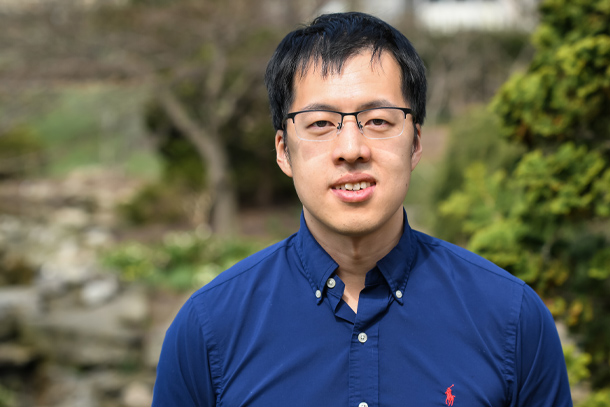
Daning Huang is an assistant professor of aerospace engineering in the Penn State College of Engineering. Credit: Poornima Tomy/Penn State
Daning Huang receives 2024 NSF CAREER Award
April 4, 2024
UNIVERSITY PARK, Pa. — Daning Huang, assistant professor of aerospace engineering in the Penn State College of Engineering, earned a five-year, $626,006 U.S. National Science Foundation (NSF) Early Career Development (CAREER) Award for a project titled, “Physics-Infused Reduced-Order Modeling for Control Co-Design of Morphing Aerial Autonomous Systems.”
Q: What do you want to understand or solve through this project?
Huang: Morphing autonomous aerial systems (MAAS), which can change configurations in-flight, deliver increased maneuverability, energy efficiency, durability and task versatility compared to their non-morphing counterparts. MAAS have potential to address societal challenges such as public safety, sustainable development and expanded access. Yet, to date, these vehicles still fall short when compared to the aerial prowess of animals, which have instinctive neuro-muscular coupling in morphing. This motivates me to undertake a control co-design approach while simultaneously considering the autonomous functionalities and vehicle design.
Incorporating high-fidelity models into control co-design brings about computational intractability challenges due to the high-dimensional design space. This project seeks to bridge that gap via a novel physics-data infusion approach, paving the way for more efficient design processes. The proposed research will establish a foundational framework that could revolutionize the entire lifecycle of autonomous systems, from production to operation, including the ability to learn and adapt over time.
Q: How will advances in this area impact society?
Huang: This project has the potential to significantly benefit society by addressing challenges to enable the energy efficient design and sustainable operation of autonomous systems. This research will provide a foundation upon which a comprehensive co-design paradigm could be developed for the entire lifecycle of an autonomous system, including, for example, the manufacturing process or human-machine teaming. As a result, sustainable, socially responsible and safety-certified autonomous systems will be able to be seamlessly integrated into human society.
The transportation, aerospace, energy and civil engineering fields will benefit from this work. Additionally, the models and methods generated by this research will be made broadly available in both the public and private sectors, fostering an equitable knowledge ecosystem and allowing for broader applications in materials science and fluid physics.
Q: Will undergraduate or graduate students contribute to this research? How?
Huang: Beyond technological advancements, the project is dedicated to fostering a strong workforce in engineering through comprehensive training and research opportunities provided by integrated teaching-learning-research activities, based on the Department of Aerospace Engineering’s Computational Science Graduate Minor and praxis experience through senior capstone projects. Furthermore, by digitizing and sharing educational resources widely, including a textbook of interactive engineering mathematics, this initiative also aims to enrich the engineering education across institutions nationwide.
Q: The NSF CAREER award not only funds a research project, but it also recognizes the potential of the recipient as a researcher, educator and leader in their field. How do you hope to fulfill that potential?
Huang: The award is a key step for my long-term career goal of developing comprehensive end-to-end autonomy co-design framework, encapsulating the complete lifecycle of a MAAS — design, control, sensing, deployment and operation — thereby facilitating the emergence of practical and high-performance MAAS. Through this process, I also hope to develop self-sustaining programs to attract and train a future engineering workforce with multi-faceted capabilities in mathematical skills, core engineering knowledge and hardware expertise, so as to produce a lasting impact in the general field of autonomy and robotics, as well as address exigent societal challenges.



